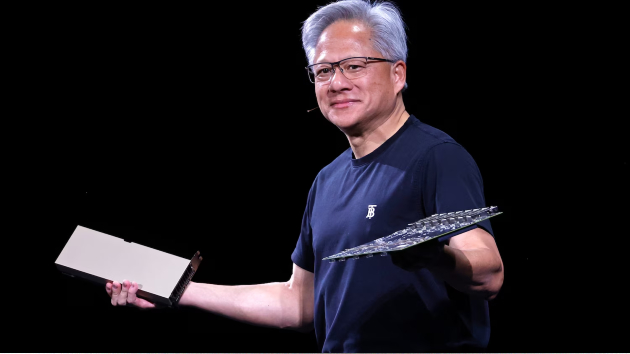
(NEW YORK) -- Chip giant Nvidia delivered more revenue than expected over a recent three-month period, the company said on Wednesday, defying concern among some prominent figures about a possible bubble in the artificial intelligence industry.
The California-based company recorded $46.7 billion in sales over three months ending in July, which exceeded analyst expectations of $46.2 billion. The jump in revenue marked 56% growth compared to the same quarter a year earlier.
The fresh data offered the latest window into the health of the artificial intelligence (AI) industry, which in recent years has become a key engine for stock market gains and economic growth.
Nvidia, the $4 trillion company behind many of the chips fueling AI products, has expanded at a breakneck pace since an AI boom set off by the release of OpenAI’s ChatGPT in 2022. The California-based company saw its stock price soar nearly 700% over the ensuing two years.
Alongside continued growth, the company is weathering new challenges. President Donald Trump barred the sale of chips to China earlier this year, before revoking the ban in July. A month later, Trump struck an agreement with Nvidia allowing the company to sell chips in China if the firm hands over 15% of revenue generated by the exports to the U.S.
Speaking at the White House earlier this month, the president recounted the agreement with Nvidia.
"I said, 'If I'm going to do that, I want you to pay us as a country something, because I'm giving you a release,'" Trump said.
In May, the company said it expected to suffer an $8 billion loss as result of restrictions imposed upon chip exports. Earnings released on Wednesday said the company did not sell any H20 chips in China over the most recent quarter, but the firm did not mention any losses related to the policy.
In recent weeks, some prominent figures have warned of an AI bubble, casting doubt on the sustainability of the sector’s gangbusters growth. Torsten Sløk, chief economist at Apollo, said last month that the AI bubble may exceed the dot-com bubble of the 1990s, suggesting that the top firms are overvalued.
In an interview earlier this month, OpenAI CEO Sam Altman also said the AI industry had become a bubble.
“Are we in a phase where investors as a whole are overexcited about AI? My opinion is yes. Is AI the most important thing to happen in a very long time? My opinion is also yes,” Altman told tech publication The Verge.
Still, the AI sector remains a bright spot for the U.S. economy. AI-related spending added a 0.5 percentage point boost to annualized gross domestic product growth over the first half of 2025, Pantheon Macroeconomics found.